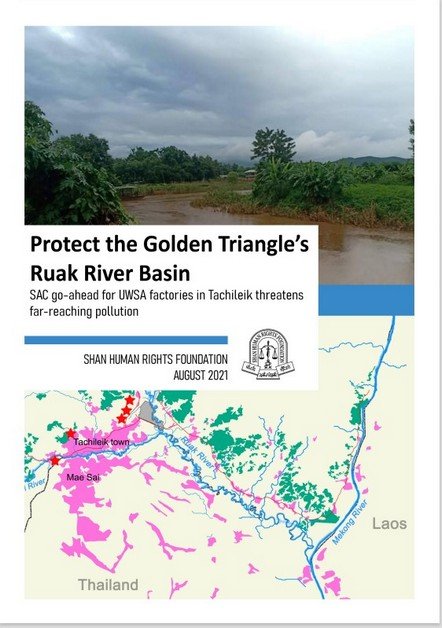Update By the Shan Human Rights Foundation
August 26, 2021
Protect the Golden Triangle’s Ruak River Basin
SAC go-ahead for UWSA factories in Tachileik threatens far-reaching pollution
Summary
Renewed efforts by the United Wa State Army’s Hong Pang conglomerate, backed by the SAC regime, to push through construction of two factories on confiscated land near Tachileik, a kilometer from the Thai border, are being strongly opposed by local communities, who want their farmland returned and fear far-reaching polluting impacts.
The factories are planned on 100 acres of land east of Tachileik town, part of a 600-acre plot confiscated from residents of Hong Luek village in 1998-1999 by the Burma Army to set up an industrial zone. The 100 acre-plot was acquired by the Hong Pang company in 2001 for factories which were never built.
In 2011, the Hong Luek farmers started appealing to the USDP government for the return of their lands in the industrial zone, which they had continued to farm where possible. Despite ongoing appeals after the NLD government came to power, on September 5, 2019, the Shan State government granted permission to Hong Pang’s Loi Sam Song company to build two factories on their 100 acre plot: a rubber crumb factory and a manganese processing factory.
In October 2019, the UWSA company tried to start fencing off the land, but the farmers blocked this. The company sued them for trespass and destruction of property, but did not proceed with construction. During 2020 and early 2021, the farmers continued to block efforts by the company to fence off their farmlands, and to appeal through official channels for land return.
On May 6, 2021, three months after the military coup, the company suddenly brought in bulldozers to begin levelling the land. When local farmers and monks again blocked this, police were brought in to protect the company workers, showing that the new regime was backing the UWSA’s plans.
During May and June, despite intimidation, local bravely continued to try and block the company’s construction efforts, but the company was allowed to work at night, during curfew hours, managing to lay cement fencing foundations around the land, which are difficult to remove. Construction has paused since early July, but locals assume this is because of the Covid lockdown.
Locals are opposing the factory construction not only due to loss of farmlands, but also fears of pollution, particularly of the Ruak River, which flows past the industrial zone before forming the border with Thailand and flowing into the Mekong River at the Golden Triangle confluence.
During the past few years, Thai water authorities have measured dangerous levels of manganese in the Ruak River, from which the Mae Sai water supply is pumped. This is likely due to contamination from existing manganese mines north of Tachileik and manganese ore stockpiles, all in the Ruak River catchment area. Construction of a manganese processing factory directly beside the Ruak River will greatly worsen the existing contamination, which is particularly dangerous for children’s health.
Locals also worry about air pollution from both factories, particularly the foul smell of rubber processing, which will permeate the eastern suburbs of Tachileik and adjoining areas of Mae Sai in Thailand, causing adverse health impacts and damaging the tourist industry.
Manganese mining and widespread rubber cultivation in Tachileik have already negatively impacted the local environment and livelihoods, for the enrichment of military elites and outside investors. The planned factories are poised to inflict even further damage, on both sides of the border.
SHRF strongly supports the brave efforts of the Hong Luek villagers to protect their lands, and urges the SAC and UWSA to immediately cancel the planned factory projects, so that the lands can be returned to their rightful owners.
We are inspired by the Mae Sai residents’ successful blocking 20 years ago of Hong Pang’s efforts to build a polluting coal-fired power plant in Tachileik, and hope that Mae Sai communities will mobilize again to join this new struggle to protect our shared Ruak river basin environment.
Contact:
Sai Hor Hseng +66: 94-728-6696 (Shan, English, Thai)
Sai Yord Leun +66: 97-173-1530 (Shan, Burmese)


